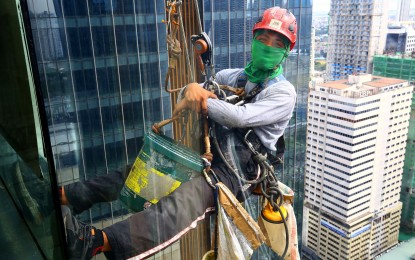
SOMEBODY'S GOT TO DO IT. A window cleaner of a high-rise building in Ortigas Avenue, Pasig City manages to smile amid another tough day at work on Nov. 21, 2023. The German Embassy in Manila is expecting increased interest among Filipinos to work in Germany with the new labor law that makes it easier for foreigners with vocational training to migrate. (PNA photo by Joan Bondoc)
MANILA – The German Embassy in Manila is expecting increased interest among Filipinos to work in their country with the new labor law that makes it easier for foreigners with vocational training to migrate.
In a statement on Wednesday, the embassy said Germany had begun the phased implementation of the German Skilled Migration Act last November.
“Germany is welcoming skilled workers with open arms and full support,” said its Embassy’s Economic Counsellor Dr. David Klebs. “This law creates even better incentives for Filipino skilled workers to consider working in Germany.”
The act will introduce new channels for skilled workers from countries outside the European Union (EU) – including the Philippines – to immigrate to Germany.
Since last month, immigration opportunities have been broadened for workers with higher education qualifications through the EU Blue Card, featuring lowered salary thresholds, expanded eligibility, an extended list of professions, and facilitated family reunification.
IT specialists, the embassy said, can secure an EU Blue Card based on professional experience alone, without a formal qualification.
The embassy said the law also ensures that skilled workers with professional or academic training are entitled to a residence permit, provided all requirements are met.
Those with completed professional qualifications or higher education can engage in any qualified employment within the non-regulated sector, and the connection between training and employment is no longer mandatory.
In addition, the employment process for drivers is also streamlined.
The embassy said administrative procedures, such as online applications are available but reminded Filipinos aspiring to practice regulated professions in Germany that they must still undergo the recognition process.
Georg Leube of the German Embassy Visa Department explains that the new act introduces provisions for the EU Blue Card visa such as facilitating work migration, especially for highly qualified workers in MINT (mathematics, information technology, natural sciences, and technology) professions and medical doctors.
He said the new provisions for assistants in nursing recognized in Germany will also enhance the existing Triple Win, a government-to-government program that allowed hundreds of Filipino nurses to work in the European states.
“With the Triple Win program or the existing work migration of recognized nurses or nurses going to Germany for recognition measures, we already have made good experiences. They are needed and welcomed in Germany’s health care sector,” he said.
“For the work migrants, even the settlement permits will be eased so they can apply for this in a shorter time than before.”
German Ambassador to the Philippines Andreas Pfaffernoschke, meanwhile, said he sees this new development contributing to a stronger Philippine-Germany relations, specifically on people-to-people ties.
“Germany and the Philippines have a huge potential in increasing their cooperation in the fight against climate change and the promotion of renewable energy,” he said.
“We are united in our commitment to a rules-based international order, and the stable macroeconomic environment offers promising perspectives for trade and investment. Additionally, we will foster cooperation on the migration of skilled workers to Germany in technical professions.”
The embassy said it continues to work closely with the Technical Education and Skills Development Authority, Commission on Higher Education and the Department of Migrant Workers to find ways to ensure that immigration is “fair and sustainable with a high standard of protection and equality for Filipinos starting to work in Germany”. (PNA)
